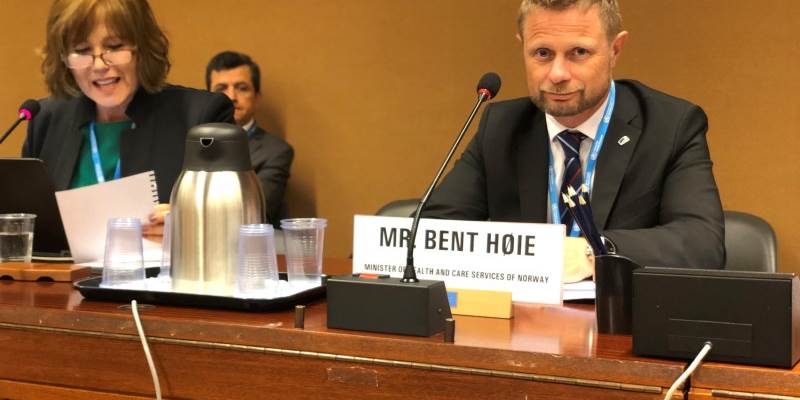In Geneva, Minister Høie and State Secretary Anne Grethe Erlandsen met with counterparts from Uruguay, Brazil, Germany, New Zealand, Canada, Romania, Colombia, and Ukraine, as well as representatives from WHO. In addition to universal health coverage, highly important topics for Norway at this year’s World Health Assembly include UN reforms, WHO’s new five-year strategy (GPW13), maternal, child and adolescent health, emergency response and preparedness, anti-microbial resistance, and non-communicable diseases (NCDs).
In his statement during the opening of the Assembly, Minister Høie made reference to the letter from the governments of Ghana, Germany and Norway requesting Director-General of WHO, Dr Tedros Adhanom Ghebreyesus, to lead the development of a joint action plan for achieving SDG 3 in collaboration with UNICEF, the World Bank, The Global Financing Facility, The Global Fund, Gavi, UNAIDS and others. In his statement , Director-General Tedros accepted the request.
- "Universal health coverage is a political choice, emanating from the responsibility of governments to protect their citizens from harm, and to provide the best possible conditions for a healthy life", Minister Høie said in his statement during the opening of the Assembly.
Minister Høie also participated in panel discussions in two side events during the World Health Assembly. The first entitled Primary Health Care and Universal Health Coverage: The evidence, contributions and effectiveness of Community Health Workers. Minister Høie, together with Director-General Tedros, Director-General of UNAIDS Michel Sidibé and Ministers of Health from Ethiopia and Ecuador, discussed the need for more equitable investments in health systems and he stressed that “health workers are the basis, the essence, of any health system”. Investments in education and employment of health personnel can benefit society not just in public health, but also in general education and in particular for girls, inclusive economic growth and stability.
In the second side event, Tackling NCDs as a major contribution to Universal Health Coverage: are regulatory interventions a cost-effective alternative?, Minister Høie argued for the need to increase progress in fighting NCDs both globally and at country level. Taxation on tobacco, alcohol and sugary drinks have proven to be effective policies that lead to behavioral change in public health, but stronger implementation is required across the globe. Industry continues to have a strong influence on public health in low- and middle-income countries. Norway believes that multinational food industry must take a collective responsibility to respect children’s right to a healthy diet. Norway is working on establishing collaborations with food industries to collectively reach the NCD goals.
